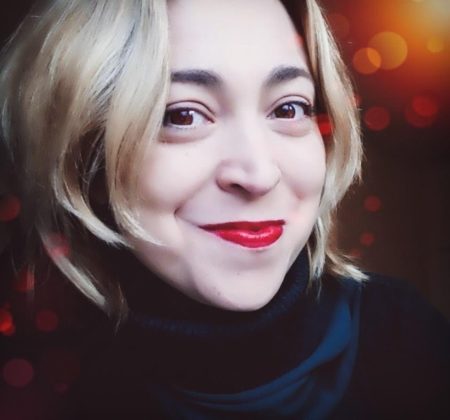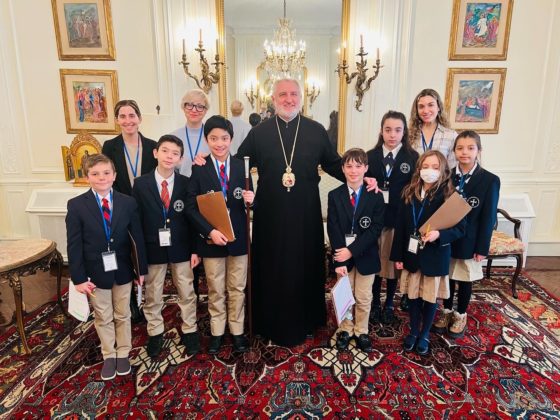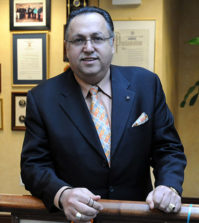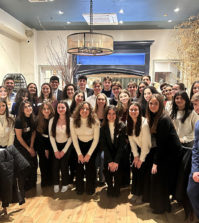The Cathedral School Makes A Comeback: An Interview with Principal Meropi Kyriacou
In the past seven years, The Cathedral School, a flagship school of the NYC Greek Orthodox Archdiocese, has gone through several administrative changes that almost brought the school to its knees and caused it to nearly crumble. What was once a thriving preschool, elementary and middle school, under the leadership of Sonia Celestin, began its decline upon her dismissal. Under her tenure, the school had an enrollment and retention of 200 students, a solid track record of student acceptances into top public, private, and specialized NYC high schools, and significant funding from the Stavros Niarchos Foundation. Then it fell victim to internal strife involving the school, the Archdiocese, and School Board incompetency. With the dissolution of the middle school, dwindling enrollment, administrative inconsistencies, and several other factors that led to the near dismantling of this once touted “hidden gem”, does the school stand a chance? It does now, and it’s here to stay. With the recent appointment of Meropi Kyriacou as principal, The Cathedral School has a bright future and more than a fair chance to get back to its core values of educating students in the ancient Greek tradition of paideia and the pursuit of excellence. Below is NEO’s interview with Ms. Kyriacou.

Cathredral School Principal Meropi Kyriacou
What made you decide to follow the path of an educator?
Although my studies and career a few years ago did not foreshadow my involvement with pedagogy, it arose “accidentally” when I arrived in the U.S. 11 years ago. The energy in the classroom and my interest both from an academic research perspective but also personally in the Greek community, especially for these new generations, won me over. The germ of perfectionism led me to deepen my knowledge towards this direction. I would also like to acknowledge the help, support and guidance of the principals and colleagues in all the community schools I have worked with to date.

Archbishop Elpidophoros with school pupils
I read that you have several degrees in different fields. How do you apply these branches of study to your role as a principal?
Whatever one acquires as knowledge contributes to who one is and how one continues to operate in life. In general, knowledge broadens your horizons not only professionally but mainly spiritually. I would say that my first degrees helped and still help in all the administrative and leadership responsibilities I have taken on so far. They help me study, analyze, maneuver and evolve in everything that arises in the workplace every day. My studies in the humanities at the postgraduate, research and doctoral level have largely determined my development in the education field, as my research focus is precisely on the shaping of identity in individuals – not just students – in relation to the events and experiences they are immersed in within the New York diaspora community.

The Cathedral School has been through several administrative changes after 2015, which have challenged student enrollment and retention. What are your thoughts on the elimination of the Middle school? Any plans to bring it back?
The school as an academic institution and symbol of the community paid a high toll amidst these changes which eventually led to the closure of the Middle school. I took the principal’s position of the school in September of 2022, at a time when enrollment was at an all-time low. This was a huge part of what motivated me to undertake the effort to contribute to its future rise and evolution. I am pleased to announce the reopening of the Cathedral Middle School in September of 2023.

The study of Greek language, history, and culture are an important part of The Cathedral School curriculum. How do you convey its relevance to non-identifying Greek students or children with no connection to the diaspora?
At the Cathedral school and as in most parochial schools in America, Greek is taught as a foreign/second language due to the passage of multiple generations’ of Greeks who choose to attend them. Students with a non-Greek background are taught Greek as a foreign language. This is the reason for the systematic retraining of our teachers so they have the skills to teach in this way. Morals, customs and modern Greek history are sporadically included in the material depending on the celebrations and historical anniversaries. Both students of Greek and non-Greek origin are educated through the teaching of these historical events, poetry and music. Ancient Greek history and philosophy relate to universal concepts and content and always meet the interest of Greeks and non-Greeks. Their contact with the Greek culture and the Greek element in general, especially the more positively it happens, favors and creates the new generations of philhellenes.

What is your teaching philosophy and how does it relate to The Cathedral School’s mission?
I believe that every student as well as every human being is unique and deserves the required attention. The teacher is the most essential tool in the classroom in terms of each student’s progress and needs to always be flexible and ready to meet different needs. Educators are responsible for providing all possible mental input to the student, to ensure his/hers maximum academic development. The teacher-student relationship is also crucial. Children learn more easily when they feel safe.
At the Cathedral school, our goal is always this individualized approach to the needs of our students, and their substantial academic preparation.

What do you hope to achieve in your tenure as principal?
I will talk exclusively about the Cathedral school and I would say that what I would like to achieve is to see this school flourish again. The Cathedral School is at the showcase of all the schools of the Archdiocese of America and as such it should have and should be treated and cared for by all. The school’s academic program is strong and I would like to see it grow along with the number of students. For me this is the priority. The daily routine of the faculty also contributes to the overall success of any program. Also, the creation and maintenance of a good group of teachers with constructive relationships between them will perfectly develop and deliver the purpose and goals of the school.
Maintaining the quality of the program we provide is essential, as well as continuing the classic approach of common core courses while also enhancing the arts & sciences with programs like the ones we introduced this year: Musical Theater, STEM and Robotics.
What do you find most rewarding about being an educator?
The success of the students and their overall progress as individuals I think is the most important reward of every teacher.
Lastly, there has always been a debate about whether or not the school is parochial or private. How do you address the difference? Is there one? How does the school seek to identify itself?
Parochial schools are private institutions. However, they do not cease to be parochial, since the parish often determines their own development, which we have seen happen to the Greek community with the closure of many of them. Their relationship with the church and the parish is sometimes strong and sometimes not. They are governed by the respective school board in which the presidents, vice-presidents and priests of the parish always participate, and then the parish is governed by the parish council. The Cathedral School is a parochial private school, since the school board includes members of the parish council, and the board directly reports to the Archbishop.















0 comments